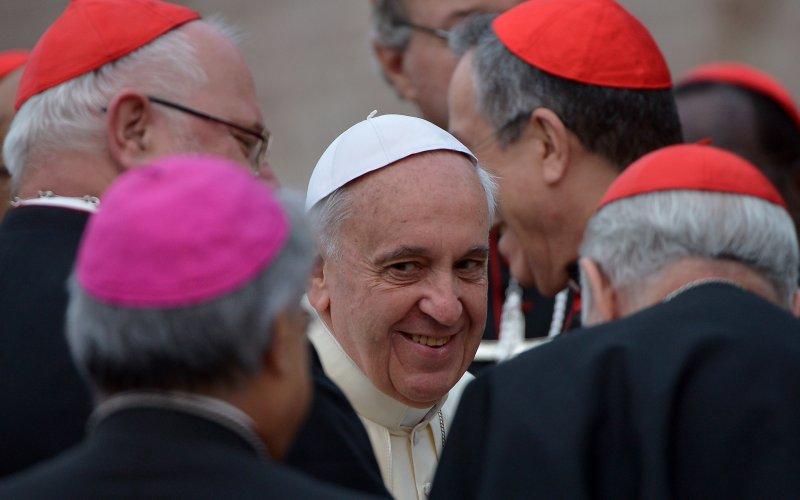VATICAN CITY—When Pope Francis travels to Sri Lanka and the Philippines next week, he will do so with even greater support than usual from Asian and other marginalized Catholics thanks his announcement on Sunday of an eclectic mix of new cardinals to be installed on February 14. But does catering to Catholics in the margins put his support at home in Vatican City at risk?
The College of Cardinals, established in its current form in 1150, is one of the most exclusive good old boys’ clubs left in the world. Not only are the 120 or so clerical members hand-picked by popes, they alone form the exclusive voting body to elect the next pope from among their clan. So when Francis announced the second batch of new cardinals of his 20-month-old pontificate, including three from Asia, three from Latin America, two from Africa, and two from Oceania, many saw him stacking the deck to ensure that his successor is, as he describes himself, from the ends of the earth.
But some Vatican experts warn that by expanding the club’s membership to the peripheries, Francis’s plan for an all-inclusive church might just backfire. American Vatican expert John Allen warns that filling the hallowed halls with relative strangers to Vatican business and protocol may ensure that the old status quo might just prevail. “Prelates who have no Vatican experience, who don’t speak Italian, and who don’t themselves have the experience of running a large and complex ecclesiastical operation may feel a natural tendency to defer to the old hands,” he writes. “Vatican insiders will tell you that when the cardinal of, say, Chicago, or Cologne, or Milan, shows up in their offices, he’s taken seriously indeed… It’s not clear that the cardinal of Tonga or Cape Verde will have quite the same muscle, at least right out of the gate.”
A lack of respect for the new generation could play into a concern echoing around Rome that the traditionalist cardinals have “declared war” on Pope Francis. The traditionalists whom Francis has rebuffed for having “spiritual Alzheimer’s,” among other maladies, apparently plan to “defend the church” at all costs, warning him that “reformism disturbs the faithful,” according to Italian Vatican expert Marco Ansaldo. Such are the rumblings in Rome that Catholic newspaper L’Avvenire has felt compelled to run a series of articles defending Francis in recent weeks. Some supporters even launched an online petition in support of the pope and against the attackers. Ansaldo says Francis’s choice of cardinals, in some ways, neutralizes some of his greatest opponents by putting them face to face with new cardinals who won’t be drawn into the political games at play within the Roman Curia.
Francis’s choice of cardinals neutralizes some of his greatest opponents by putting them face to face with new cardinals who won’t be drawn into the political games at play within the Roman Curia.The other concern is that by extending the traditional borders of the voting body, reaching a consensus may be harder when it next comes time to vote—especially if more than one “end of the earth” candidate emerges. In that case, Vatican watchers say it might be easier for the more traditionalist blocs to rally around a more traditional frontrunner, ensuring a return to the era of past popes. The biggest blocs in the current college are Americans and Italians, who could easily sway the vote, which is likely why no Americans and only two Italians were named as new voting cardinals.
Francis has appointed Americans like Sean O’Malley to lead important commissions like the one on the burgeoning child sex abuse problem in the church, but the pope has not yet appointed an American cardinal, keeping the number at 18. “There are no new Cardinals from North America (the USA or Canada) because they already have a significant number, and that number has remained stable during the past year,” Vatican spokesman Father Federico Lombardi said in notes to the press after the new cardinals were named. “The fact that only one of the new Cardinals is from the Roman Curia is also notable, while Roman Cardinals remain about a quarter of the electors.”
The two Italian cardinals Francis did tap were significant. Franco Montenegro, archbishop of Agrigento, Sicily, was at Francis’s side during his first ever papal trip in July 2103, when he visited the Sicilian island of Lampedusa to pray with refugees and illegal migrants who risked their lives to find a better life in Europe, a decision that shocked many who had been quick to criticize irregular migration at the time. The other new cardinal, Bishop Edoardo Menichelli from Ancona, Italy, was one of the 26 personal appointees to the Extraordinary Synod on the Family last October, presumably because he shared Francis’s open-minded reformist agenda.
In an extensive profile of each of the newly named cardinals, American Vatican expert Robert Mickins points out in National Catholic Reporter that the new cardinals will shake up the old guard. “Prelates at the helm of a number of major archdioceses and some Vatican offices, all usually led by cardinals, were denied red hats,” he notes. “Instead, Francis will place them on the heads of bishops to whom Roman officials don’t usually defer. They will now.”
